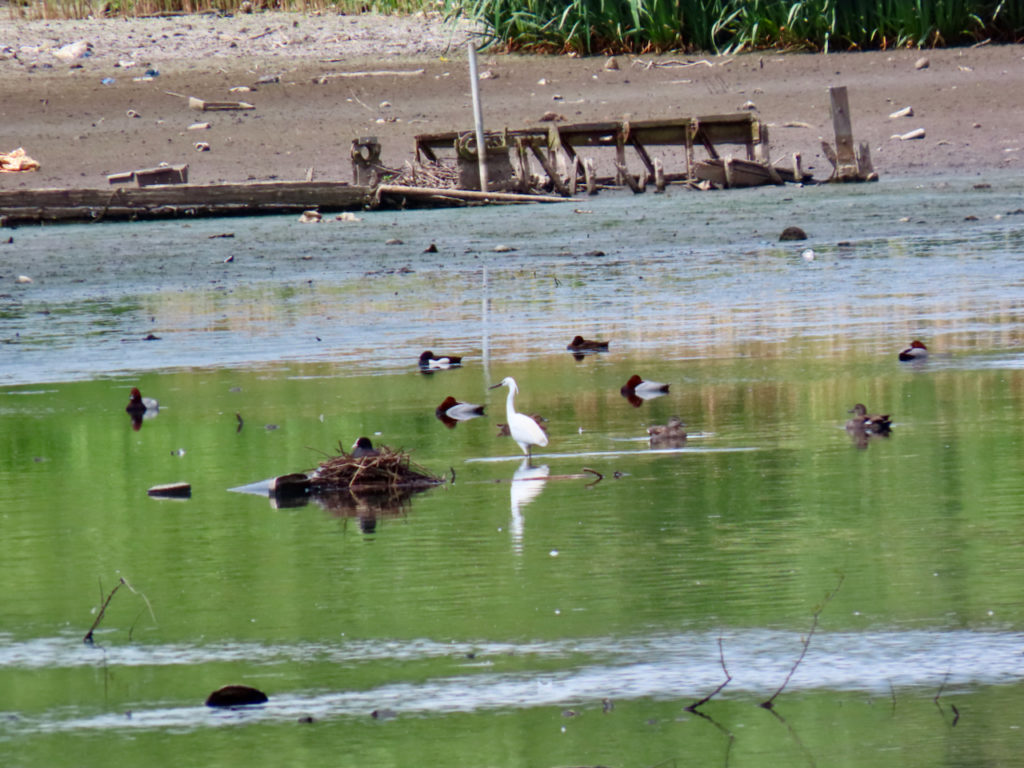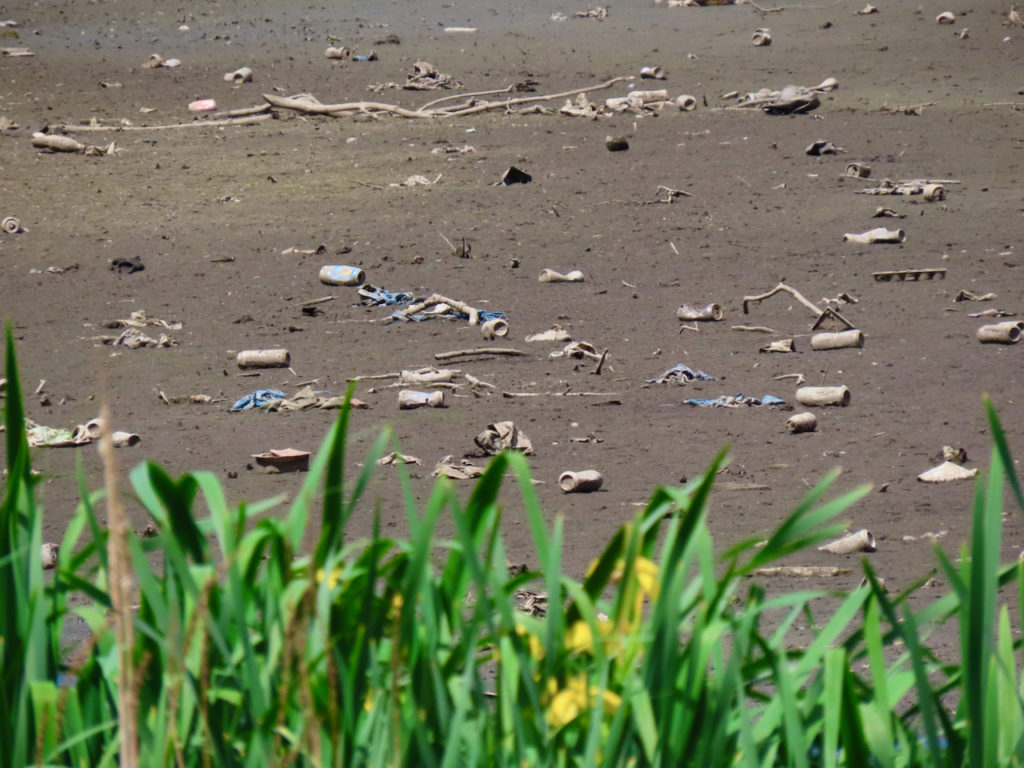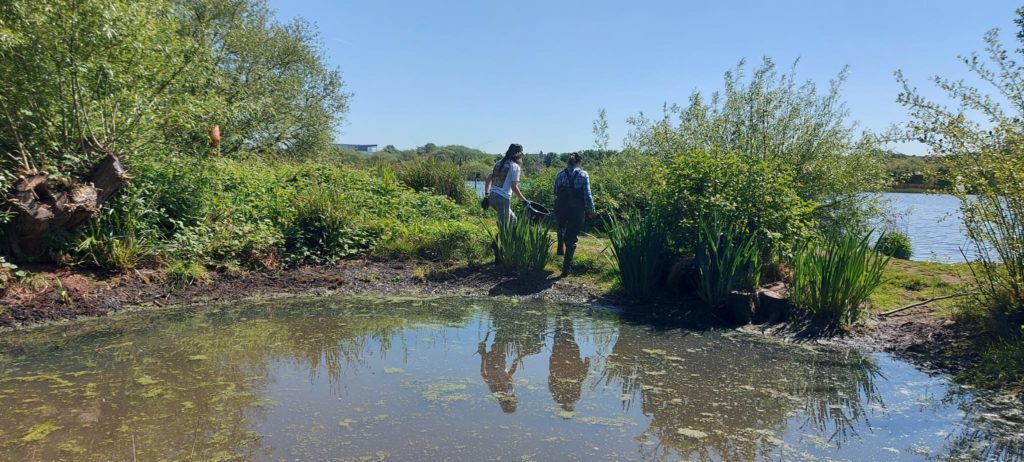As the waters of Brent Reservoir (Welsh Harp) dwindle, revealing a blight of plastic pollution, Ben Watt wonders: why does it fall to volunteers to sort it out?

May. While wild garlic groves transform the remote corner near the industrial estate, the lack of rain for several weeks is having a critical impact on the wetlands at Brent Reservoir (Welsh Harp). Water levels are low. The decades-old build-up of sediment in the marshes has been quickly exposed. Black silt reefs in the two shallow river deltas dominate the protected SSSI bird habitats, and with the sun gently baking down, the top layer has developed a spongey crust like a well-turned brownie.
The result has been bad news for the spring bird population. Migrant wader numbers — patchy around the country this year due to strong northerly and easterly winds in April — have been almost non-existent at the Welsh Harp. Two or three hardy common sandpipers and an intrepid little ringed plover are about all anyone has seen this year.

It all highlights the parlous state of the feeding grounds. There is mounting concern about the quality of the water and the sediment’s ability to support sources of food. Spillage from the nearby paint factory fire in 2018 entered local outfalls, and the Environment Agency’s own current public data shows the water in the inflowing Silk Stream and Dollis Brook as only of a ‘moderate’ standard, and has been since the nineties. Both streams are in reality mostly urban runoff in which invertebrate numbers are rated ‘poor’, dissolved oxygen levels ‘bad’, metal content ‘high’ and levels of toxic chemicals are excessive. Not great.
Underpinning all this is the Water Framework Directive, enacted in the UK in 2003 with the aim of bringing all water bodies into ‘good’ overall health by 2015. Sounds good on paper. Sadly though, through government under-resourcing, the project soon had a new target of 2021, and then, some might say inevitably, 2027; even that looks optimistic. And who reports to the government every three years to see how it’s all going? Yes, the under-resourced Environment Agency.
If it all feels sisyphian, it also surely says little for the current government’s actual commitment to the environment and the funding of a meaningful green agenda.
This week, Thames21, an independent charity working with London communities to improve rivers and canals, announced their PlasticBlitz for September — a week-long, volunteer-dominated mass cleanup of plastic waste from the Thames and its tributaries. Projects like this are of course desperately needed and I highly commend them; God knows, looking out at the rubble bags, cans and buckets still jutting out of the dry silt reefs at the Welsh Harp, the place could do with them; but then I was taken aback to see that this particular initiative is an upbeat joint venture with the Environment Agency. I can’t be the only one who is starting to think there is a danger clean-ups like this — however worthy — are being normalised as just a job for the public, with the Environment Agency on the sidelines quietly grateful for the free help.
The press release even blithely says: “Once plastic enters our rivers, there is no statutory obligation for any organisation or public body to remove it.”

How can any of this be right? Two of the Environment Agency’s stated statutory responsibilities as a body answerable to DEFRA are “water quality and resources” and “conservation and ecology”; and one of their statutory priorities is to “protect and improve water, land and biodiversity”. So why are they rounding up mums and kids and retirees in hi-vis gilets to do the improvement for them?
Having met and talked to several people at the Environment Agency over the past year during our campaign at Brent Reservoir, I know this is not the fault of the employees at the sharp end. They too wish it were different. They didn’t take the job to do a bad one. None of them want agri-pollution killing chalk streams, wildlife dying of plastic ingestion and entanglement, and unquantifiable amounts of microplastics entering the food chain. The reality is goverment funding and resources for the Environment Agency are simply inadequate and the executive leadership too often slippery and truculent. Meagre budgets end up being prioritised, and that means more is being spent on flood resilience than on water quality and biodiversity gain, when it shouldn’t have to be a choice. As statutory obligations, there simply should be enough money for both. No wonder morale among the workforce is low and whistleblowers are speaking out, with claims they cannot do their jobs and the regulator is no longer a deterrent to polluters.

Back at the Welsh Harp, the drought has at least brought the best out of the local volunteers. The newly-planted rare pond flora has been suffering from lack of…well, pond. Two weeks ago a chain of helpers tried refilling it using buckets of water from the reservoir, but ran out of steam, so last Sunday someone imaginitively enlisted the nearby fire brigade. It was like an episode of Trumpton. Unfortunately they arrived but couldn’t get the fire engine through the gate. A resident has come forward suggesting a self-priming water pump that works with a power drill.
I love these guys.
*
Ben Watt is a musician and writer, best known as one half of Everything But The Girl. His memoir ‘Romany and Tom’, about his parents, was nominated for the Samuel Johnson (Baillie Gifford) Prize. He runs Buzzin’ Fly Records, and in 2021 founded environmental pressure group Cool Oak.